In University Theatre’s “The Father,” reality morphs and crumbles, and audience members may find themselves “misremembering” key moments. The story is told through the eyes of a man suffering from dementia.
“If you were to put two scenes next to each other you would see, oh, that’s a very different version of the same events, but it’s all coming from the same perspective,” said the play’s director, Nelson Barre. “You start wondering, which version do I believe?”
The play opens on Jan. 26 at 7:30 p.m. at Hope Theatre and runs through Feb. 10. On Feb. 4, after a 2 p.m. showing, an open discussion will be held featuring two caregivers, a physician and possibly a person living with Alzheimer’s.
“The Father,” written by French playwright Florian Zeller, premiered in Paris in 2012 and won France’s prestigious Molière Award in 2014. Its English translation reached Broadway in 2016.
“I was particularly struck by it,” Barre said. “My grandfather died from Alzheimer’s in 1996. My Ph.D. research is on memory and how it’s depicted in theater, so it linked all those things together.”
While putting the play together, Barre met with Abby Gershenzon, the regional coordinator of the Alzheimer’s Association Cascade Coast office. Gershenzon came on set to give a presentation on Alzheimer’s.
“We were constantly thinking, okay, based on the things that we know, from our research and from talking with Abby, all of these are the choices that we’ve made so that the ways in which we are dealing with dementia and Alzheimer’s are as a realistic as possible,” Barre said.
In a country where one in 10 people over the age of 65 have Alzheimer's, Barre isn’t the only person involved with the play who has a personal connection to the disease.
“Every single person on our cast had someone in their life who had somehow been affected by dementia or Alzheimer’s,” Barre said. “It became a tremendous space of sharing. Thinking about all that obviously brought a lot of emotions for all of us, but also, I think, helped us understand what these people are going through and that they’re trying to live their lives just like everyone else is.”
Barre hopes the Feb. 4 discussion will be a dialogue between the experts and the audience, many of whom will likely also have loved ones affected by Alzheimer’s or dementia. Ultimately, Barre wants audience members to walk away with understanding and compassion for those affected by degenerative brain diseases.
“They are more than the disease, they are still humans,” he said. “You can’t just think of it as ‘Oh, well if this happens they’re just going to forget. It doesn’t matter.’ These people have agency and they have importance and they have a place in the world, even if to them that place is unstable.”
For show times and dates and to purchase tickets, visit the UO Ticket Office’s website. Tickets are $10 for adults, $8 for seniors, faculty, staff and non-UO students, and free for UO students.
—By Sarah Eddy, University Communications


